Looking for the best tips for a plastic-free kitchen? Then you've come to the right place! I do without as much plastic (waste) as possible in the kitchen - whether with the food itself, as well as with the kitchen utensils, cutting boards and items for storage.
In this article I will give you my best tips for a plastic-free kitchen. You will quickly realize that this project is not that complicated.
17 tips for a kitchen as plastic-free as possible
The tips will help you get closer to a zero waste kitchen. You shouldn't just throw everything away and replace it, but rather use many things for as long as possible until they eventually die. This way, you'll give your plastic kitchen utensil as long a life as possible before it can be recycled. Got it? Then let's get started!
1. use wax paper instead of cling film
Wax paper is the ideal replacement for the classic plastic cling film. Because it can be reused on the one hand and is made from natural material. I myself use Organic cotton freshness wipes and vegetable wax (you can get here*), but there are also classic Beeswax wipes. (e.g. here*)
Either way they make Food longer shelf life and avoid huge amounts of disposable waste. Storage with the wipes works perfectly and is an important part of the kitchen without plastic.
Tip: You can get your Oilcloth even do yourself! How this works you can read in the linked article.
2. wooden cutting boards prefer
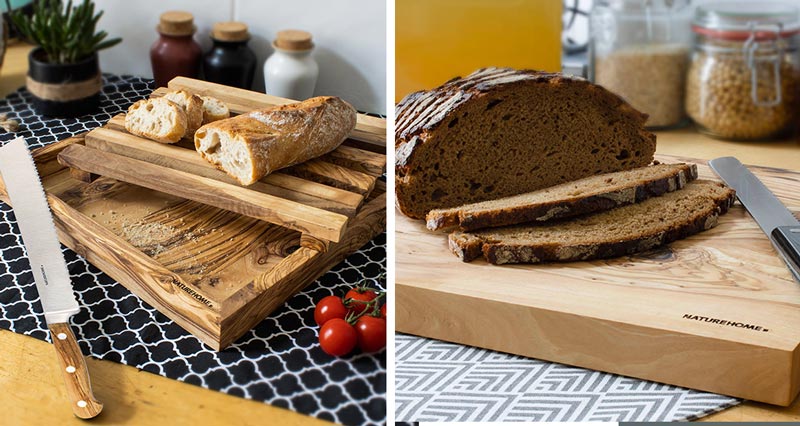
Do you still have plastic breakfast boards in your kitchen? And your cutting boards are not plastic-free either? On the way to your plastic-free kitchen you should replace them. As sustainable and eternally reusable material are suitable for Cutting boards wood, stone and also pressed rice husks. They all make a visual impact and really last an eternity.
3. make dishwashing liquid itself
Dishwashing liquid bottles make regularly plastic waste in the kitchen - often the dishwashing liquid itself is also with chemical ingredients compiled. In the article Make dishwashing liquid yourselfYou'll learn step by step how easy it is to make your own dishwashing liquid. All you need is the wonder weapon Baking soda and natural plant soap.
Just as well works the DIY dishwashing liquid also from ivy leaves. How easy you can make it, you will also learn in the linked post.
4. tap water from glass or stainless steel bottle drink
My glass or stainless steel water bottle is the most important part of the Zero Waste Basic Equipment. Not only because the drinking bottles do not use plastic, but also because the Tap water tastes better, is cheaper and without lugging water boxes directly in the apartment.
Tip: I can give you these Stainless steel drinking bottle* or these Soulbottle glass bottle* recommend!
5. get plastic free juicers
We had a plastic juicer at home for a long time for lemons and other citrus fruits. When the broke, we are then directly on a Wood juicer switched. A cool accessory in the kitchen without plastic that really lasts forever.
6. stainless steel straws OR GLASS
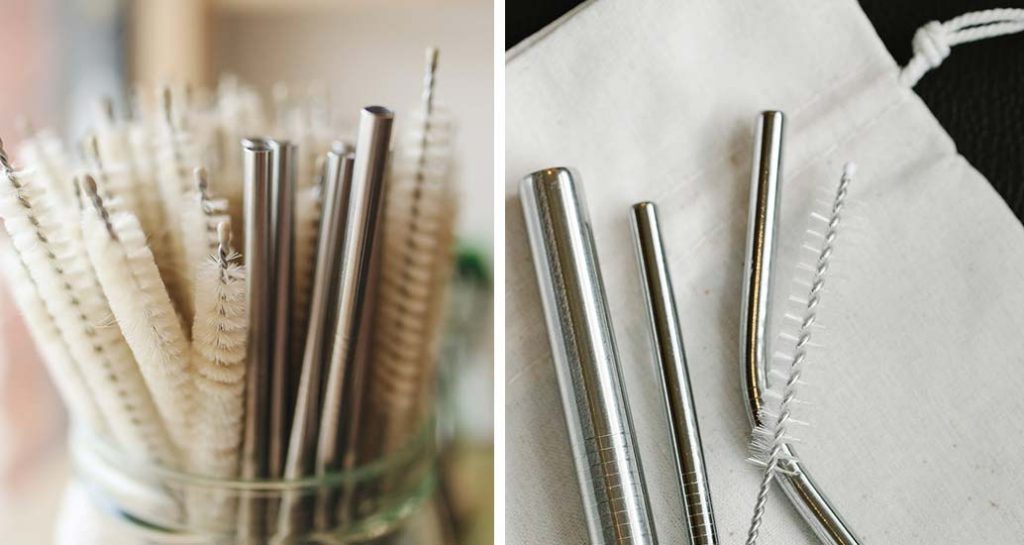
Plastic straws are particularly easy to avoid. There are hardly any disposable products for which there are so many plastic-free alternatives. Simply use reusable Stainless steel strawsglass or bamboo wood for your plastic-free kitchen. Or do without straws altogether, of course that works too 😉.
7. say byebye to coffee capes
Every year, we Germans consume About two billion plastic coffee capsules and thus produce around 4000 tons of plastic waste.₁ Instead, treat yourself to a roasted coffee from paper packaging. You can filter it with stainless steel reusable coffee filters, to avoid further waste.
8. use cloth towels instead of paper towels
Let's face it: many people use classic kitchen paper for every little stain in the kitchen. Even if the kitchen paper itself is made from sustainable material, it is now once wrapped in plastic. For a plastic-free kitchen, simply switch to reusable cloth towels and wash them regularly. This will save plastic and paper waste and Conserves natural resources.
9. plastic free canning jars use for storage
Zero Waste is a real lifestyle. Representative of this, in my opinion, are the Preserving jars, which can be used both wonderfully to aesthetic storage as well as to the Grocery shopping (for example, in the unpacked store) are suitable. The next step to the kitchen without plastic!
10. natural garbage bag instead of plastic bag
Even the garbage bag for your waste does not have to be made of plastic. There are now countless biodegradable garbage bags - in the recycling process, however, they can still cause problems. In a kitchen that is as plastic-free as possible, you can therefore also get your Fold garbage bags from old newspaper yourself or line your trash can with cardboard paper.
11. wooden dishwashing brushes
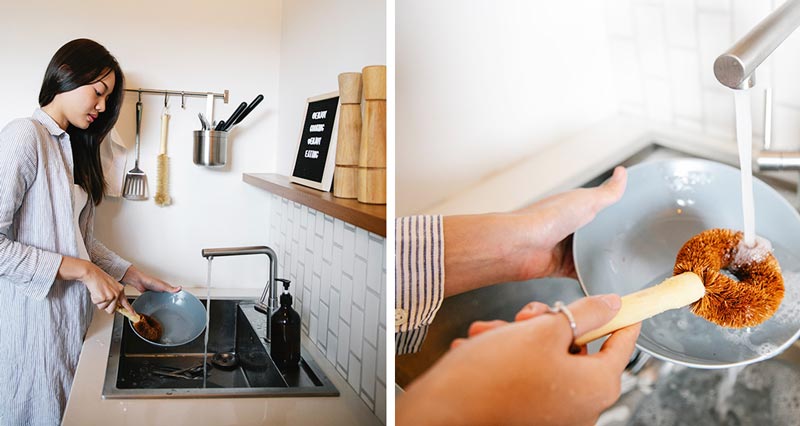
Plastic dishwashing brushes are certainly very cheap, but can be wonderfully replaced with a plastic-free alternative after they become unusable the next time. Sink brushes from wood I can recommend to you! They make visually something, last at least as long - and also the In most cases, bristles are made of fibers., a vegetable fiber.
12. grow your own herbs
If you're looking at herbs in a Plastic box or in a plastic foil you end up with a lot of plastic waste again. The herbs are also used up quickly. Why do you plant the Herbs not simply themselves in the kitchen or in the garden on? Because this is also part of the kitchen without plastic and allows you to become a little more plastic-free again.
13. stainless steel can instead of plastic can
If you're preparing a lunch for work, don't put it in a plastic can, but instead use a Stainless steel lunch box use. It is just as tight, lasts a long time and does not smell. This stainless steel box* is the perfect plastic-free alternative for on the go.
Notice: However, please replace your old lunch box only when it has become absolutely unusable. So you use the natural resources, which were necessary for the production of the lunch box, still as long as possible.
14. natural fiber tea towels
Tea towels, napkins and dishcloths are often wrapped in plastic or are themselves made of plastic fibers. Reusable Cloths from linen or other natural fabrics belong in every kitchen without plastic. You can even make them yourself from old T-shirts or tablecloths - maybe a cool Idea for your next sustainable DIY project? 🙂
15. wooden kitchen utensils
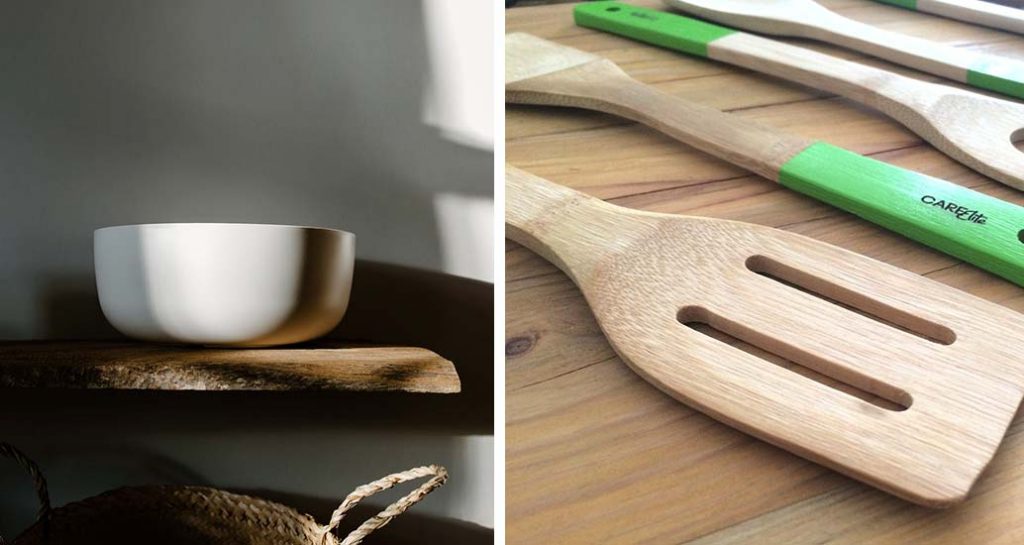
Plastic kitchen gadgets have had their day. Why don't you switch to plastic-free Bamboo wood kitchen utensils um? Also Pots, pans, boxes and other items from the kitchen now manage without plastic, are eternally reusable and live - at least in my experience - significantly longer.
Tip: I even have our Dining table homemade from old oak planks. Feel free to look at the construction process and all the important tips about it.
16. also good for sustainable cuisine
With the tips I've given you so far, you're well on your way to a plastic-free kitchen. However, in order to make it even more sustainable, I would now like to give you a few tips along the way:
- Don't waste food: In Germany, we are among the leaders in food waste because everything seems to be available in unlimited quantities and is affordable. Therefore, try targeted, Reduce food waste.
- Reduce your water consumption: Particularly in the kitchen hides great potential for save water in the household and to value the natural resource of water.
- Kitchen made of sustainable material: Even the furniture in your kitchen can be environmentally friendly. From the origin of the wood from regional forests to the pollutant-free paint. In this post you will learn more about it.
- Prefer hand-operated kitchen appliances: To also save energy in your plastic-free kitchen, you should use kitchen appliances that don't require electricity and can be used manually. For example such a stainless steel whisk* or the already mentioned Wood juicer*.
Kitchen without plastic? No problem!
There is hardly any other area in our household with as much zero-waste potential as the kitchen! I hope that my tips will help you to a plastic-free kitchen. But please don't stress! The change really doesn't have to happen from one day to the next, but step by step. Just replace plastic items little by little as soon as they break or you feel like it.
I'd love to hear from you in the comments with your personal experiences, your questions and possible, further ideas for a plastic-free kitchen!
Stay clean,

PS.: If you already design your kitchen without plastic, you should also definitely read the article Plastic free living - tips & tricks read through. There you will find all my tips for living without plastic at a glance. Have fun!
References:
₁ B. Nicolai: We produce 4000 tons of coffee capsule waste (as of 08.01.2014), available at https://www.welt.de/wirtschaft/article123656432/Wir-produzieren-4000-Tonnen-Kaffeekapsel-Muell.html. [09.11.2021].


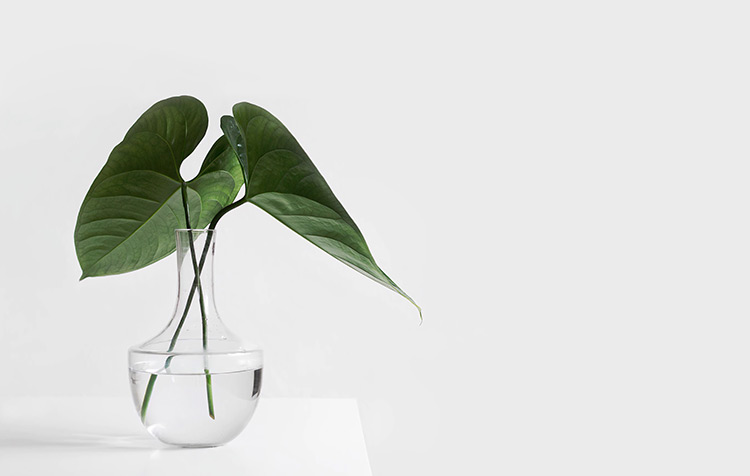
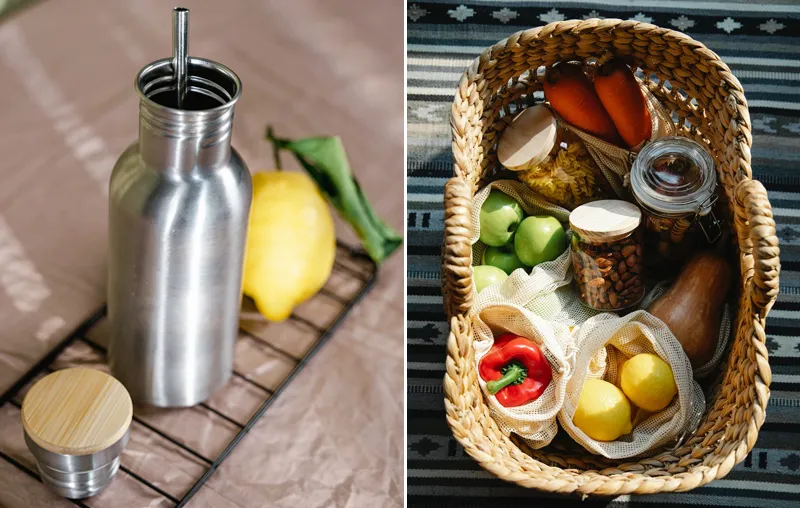

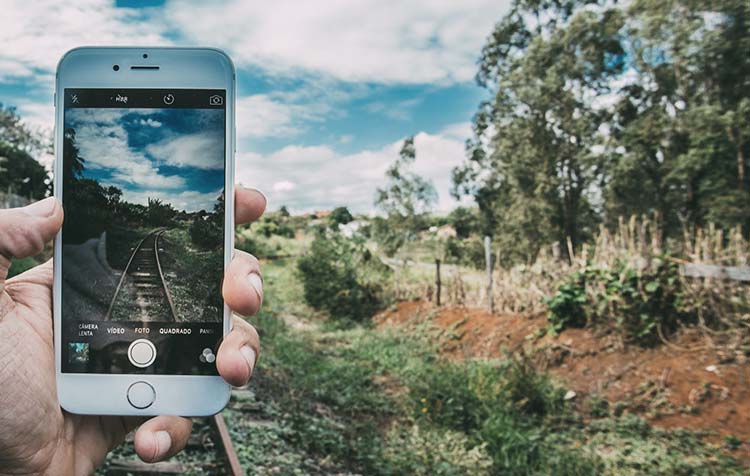
Kitchen without plastic became the motto of my brother's restaurant. After all, they are beginners, but they made this choice. I mean, it's their first marketing step. But if the kitchen remains open, there each of the regulars can freely see how things are going in the kitchen.
Hi Helga! I think that's awesome. Just because this move is also used as a marketing tool doesn't mean you can still be passionate about it. Good luck and best regards,
Christoph
Hello Christoph,
what I'm still missing here is a plastic-free alternative to the dish sponge. And even conventional dishcloths are often made of plastic (microfiber).
Maybe you still have ideas?
Many greetings
Diana
Hello Diana! Happy New Year. There are, for example, loofah rinsing sponges that do not require plastic. I will update the article soon 🙂
Many greetings
Christoph
Hello
I also try small white to do without plastic
But what should I do with the still Tupperware?
And for coffee, we have the Cafisimo capsules to bring back.
Since my husband and I are rarely at home and at most a total of 3 häferl drunk.
Hi Michaela, I think that's great!
Of course, if the Tupperware still works, don't just throw it away, use it as long as you can.
In what way capsules to return? Are they reused? (Sorry, I am not a coffee drinker)
Best regards
Christoph
Hola Christoph....
On the subject of wood and germ-free, I had to laugh heartily! I was born and raised in South America and have lived here for a long time, but I could never really get used to the germ-free German mentality.
Your ideas are great and I would like to add a little insight to them....we ALL have too much stuff and too little time.
We can learn a lot from the "poor" kitchens in other countries.
Do not think so cerebrally where harmful substances hide, the most harmful are negative thoughts.....Saludos Andrea
Hi Andrea! I see right, a little minimalism and a simultaneous appreciation for what we have would do us all good.
In this article, I'm also just giving you food for thought about what you can do in the kitchen without plastic 🙂
Many greetings,
Christoph
Hello Christoph, very informative and many good ideas!!! What I personally do not find so great are the many links on Amazon. With everything plastic-free you should avoid corporations that treat their employees badly and themselves lack any social, ecological, environmentally friendly thought.
Hi Suzanne, thank you for your comment. This article is already a bit older - it comes from the start phase of the project, where I was dependent on every cent. Now I am revising the whole site, have gained many new partners in addition from Amazon and will create a fair balance for all. I hope this calms you down a bit and wish you a nice evening.
Many greetings
Christoph
PS.: Thank you for your feedback!
I love to implement plastic-free more and more. We have an unpackaged store here, I use that! You know where the food comes from and how it is delivered.
Actually sad, if you consider that in the past all this was already. When no plastic stuff was available.
I think your article is good, however, it is unfortunately a myth that the bags for biodegradable are also good. Just saw a report the other day! Is still plastic. And this is decomposed and enters the earth and groundwater as compost. Microplastic. And with us again on the plate. I always use the newspaper for it. I have a bucket, I put newspaper in it and then the organic waste goes in there. In addition, the bags are not cheap and in the production also absolutely not environmentally friendly.
Thanks for your suggestions.
Hi Melly! I'm glad to hear that! 🙂 Yes, it's honestly really embarrassing that we slept through the plastic age.
Thank you for the hint! The post is already a few days older, meanwhile I know it better.
Best regards,
Christoph
Hi! Really great for starters. I can not recommend the bamboo kitchen roll, unfortunately, after multiple washing they are badly deformed. But what works great is simply a 10-pack of children's washcloths from the Sweden. Hold forever, absorb a lot and do not stain the other laundry. We use them as kitchen roll replacement, napkins and wet wipes for the hands (kids).
Many greetings
B
Super! Thanks for your tip 🙂
Many greetings,
Christoph
A very factually written article without the usual demonization of plastic. I think one should remain balanced. I love my plastic storage cans, which have been in my household for 20 years. When I think about how many times they have fallen off, with glass it would be problematic. There are now also events where glass bottles are banned.
I agree with you about plastic as disposable packaging, saving really makes sense. I now get dishwashing liquid and Co. In refill bags, so that I don't have to dispose of the whole spray bottle every time.
The best thing I found was the citrus juicer, which was completely new to me. Thank you for this innovation.
Hi, thanks for your comment and please excuse my late reply. Yes the lunch boxes last forever, that is also good.
Thanks for your feedback!
All the best,
Christoph
Hello everyone,after reading many comments , has crystallized for me one very strong : no matter what alternative is offered .....irgendjemand finds a BUT.....wird da förmlichst sought ?
There I get a neck ......der Christoph has made it a passion to show us tips tricks and alternatives ......da there are comments such as: Wood is a germ sling .....I do not know exactly how many centuries already wood is used in the kitchen ......has not harmed anyone .....plastic already!
One should use its common sense and start with the most important and simplest .....beim beim Einkaufen....genug eggs in the trousers have and its will plastic-free to buy through !
The cashier halt my 10 tomatoes 5 apples 20 potatoes unpacked put on the belt ....nervt already with only one customer .... imagine it would make ALL !
My conclusion from the whole plastic madness is: I start with shopping and then work my way forward according to the squirrel method, laboriously but steadily.
It is like with all things ...the mass makes it....in the positive as in the negative.
Many thanks to Christoph for the time you invest for us Beate
P.S. my children have grown up with plastic .....they have both become environmentally conscious adults without any great effort .....common sense !
Hi Beate!
Thank you for your comment and your support 🙂 That's part of it, together we're all trying to do more and more right. Everything at once is difficult.
Many greetings,
Christoph
Thank you for the great compilation. Most of it has already been implemented in our house two years ago and is practicable despite the child. You really have to want it!!! Comfortable it is not, especially if you have to organize a job, family and household. But it's doable and getting easier.
Wood and food is not a problem at all! Recently there was a germ test and there was plastic and silicone dirtier than wood. Wood has an antibacterial effect and is for us the best alternative next to stainless steel in the kitchen?
Hi Nana! I think it's great, keep up the good work 🙂
Remains clean,
Christoph
Wood is a super bad alternative is the purest bacteria and germ slingshot comes me under no circumstances in my kitchen and to my food!Instead of this article and household helpers made of silicone use!!!Wood is the biggest shit in connection with food!!!
Hi Susanne! Clean thoroughly on a regular basis, then you'll be fine 🙂
Stay clean,
Christoph
Hello!
Very excited I read your article and get really new ideas. Thank you for it and especially with children to implement well! They should take it with them for the future! I find it a pity that you, although working against consumption and pro nature, almost all products emfehlt calculated via Amazon. Allegedly, for example, all returns go directly to the garbage. I prefer not to support that.
Nevertheless, of course, good thing you do!
Many greetings, Tina
Hi Tina! Thank you for your lovely feedback 🙂
I have been an Amazon seller for 2 years now. They don't destroy a single returned item of mine. I get all the unsaleable items back and give them away, repair them or sell them. I can only speak from my perspective as a seller. Soon, however, CareElite will also have its own online store where 100% can be sent plastic-free 🙂
Stay clean,
Christoph
That's all great, but some of it is really difficult or even impossible to implement. Especially with children.
Hi Marcel! It's not easy, that's true. But you don't have to implement everything at once 🙂
Don't be put off by the terms ZERO waste and plastic FREE, think of it as a long term goal and just learn step by step how to avoid waste.
Stay clean,
Christoph
Hello Christoph,
quite good tips, although I already implement most of it. By the way, you mentioned to replace plastic only when it breaks, which of course makes sense in my eyes. Super find I also that you learn immediately where you can buy the alternatives.
Many thanks
Hello Ulrike! Thank you for your feedback and your positive attitude.
Keep up the good work,
Christoph
Good morning!
A super collection, I must say, even if in places not new (the topic is increasingly taken up in blogs, etc.).
I'll add my two cents on several points at this point:
1. organic waste bags are not allowed in my organic waste garbage can (determined by the landlords). Therefore I use newspaper. Years ago, I bought a "latticed" organic bin and put two layers of newspaper in it - it works great. Especially since it saves money, because everyone actually gets newspapers at home.
2. even though I myself have the same bamboo cookware as in the picture, I am not proud of it. Of course, bamboo grows fast (compared to other woods), but it is also very often glued. I could not say, for example, if bamboo items are one piece, because as a plant they are not very thick and especially sometimes hollow. With me, in any case, they had an unpleasant taste for a very long time (sauce, etc. to taste over it). Therefore, I avoided it at some point from food to put in my mouth. Long story short: rather take other woods.
But I don't think it's really "right" to banish all plastic from your household, i.e. throw it away, because of the changeover. Nevertheless, it is more ecological to dispose of these items only when they break or something similar. Plastic is very durable (e.g. as a lunch box).
Best regards
Hi Monika! Thanks for your comment, I agree with you on all points.
Now I have to go through my article again to see if I really mentioned throwing away all plastic things 😉 Of course I shouldn't have done that. Tupperware, for example, can be reused forever and that's fine.
Many greetings,
Christoph